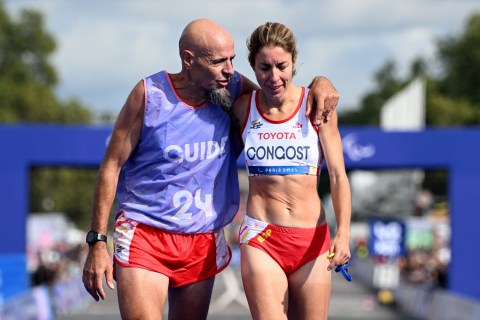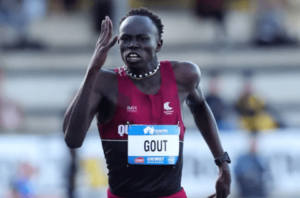
Worst tragedy: Paralympic marathon runner reveals how much money she lost after disqualification” Spain appeal rejected….
Spanish marathon runner Elena Congost has revealed that her controversial disqualification at the Paralympics has cost her €30,000 (£25,000).
With a personal best time of 3:00:48, the 36-year-old placed third in the women’s T12 marathon in Paris; however, she was disqualified from receiving the bronze medal because, a short distance from the finish line, she lost her tether connecting her to her guide, Mia Carol. Carol was experiencing cramps on the home straight when Congost helped him, but Paralympic regulations prohibit athletes from touching their guides or releasing their tethers.
Spain’s appeal against the decision was denied, which meant the bronze medal went to Japan’s Misato Michishita, who finished over three minutes behind Congost.
That gesture cost me €30,000, which is the prize money for the medal, plus my monthly salary, which is food for my children. And that was what hurt me the most,’ Congost told ABC.
‘Athletics is my passion, but I make all the effort for my family and for my children and to have economic stability because, in the end, it is my job. Nobody works for free. You don’t eat nothing.
‘I made a titanic effort in a year after being a mother four times for them, to have a better family economy and to be able to work in what is my passion, which is a privilege. And I saw it all taken away from me. Everything I have done has been for nothing.
‘I made a huge effort for my family, I had achieved it and they stole it from under my nose.’
Congost also revealed that it was a member of Japan’s team who spotted the infringement and notified the race judges to get her disqualified.
Asked if she would have accepted the bronze medal if she were the Japanese athlete, Congost replied: ‘I don’t know if that athlete was aware of the reason for my disqualification. It’s a member of her team who saw the action and was going to disqualify me.
‘One of the things they told me at that moment was: ‘Elena, there’s a lot of money at stake.’ As an athlete, if I knew the reason and what happened, I would refuse to go up on the podium without the other athlete.
‘Either they give two bronzes or they give it to the one who deserves it. I wouldn’t have accepted a medal, but I don’t know if the athlete knows the situation or if they told her that the Spanish athlete had cheated… I wouldn’t have accepted the medal in her place. Also, this athlete cheated because images have been seen, but this is not up to me. It’s not my responsibility.’
Congost also claims that there was ‘cheating every day’ at the Paralympics with athletes being helped by their guides.
‘In a gesture like letting go of a rope you have to look at the context and why it happened, whether there are benefits or not… the next athlete was three minutes behind, I could have crawled in if I wanted to,’ Congost said.
‘We weren’t bothering anyone, the result of the competition wasn’t altered, nothing changed with that one-second act, you can’t punish them.
‘And even more so when during these Games we have seen cheating every day in the Olympic Stadium with blind athletes dragged by their guides, because they are athletes who are 1.50m tall with guides who are like cupboards and in speed tests they are carried on their shoulders.
‘After seeing so much cheating and no one being disqualified, to be the only one and to be thrown out onto the street, after having run 42 kilometres, for five metres in which an action of one second takes place.’
Asked if she regrets helping her guide, Congost replied: ‘No. And I hope that no one regrets such a nice act as helping your partner who has been running 42 kilometers at your side to help you and be your eyes.
‘I may regret not having thought of walking, but now there is no turning back. You don’t see this coming.








